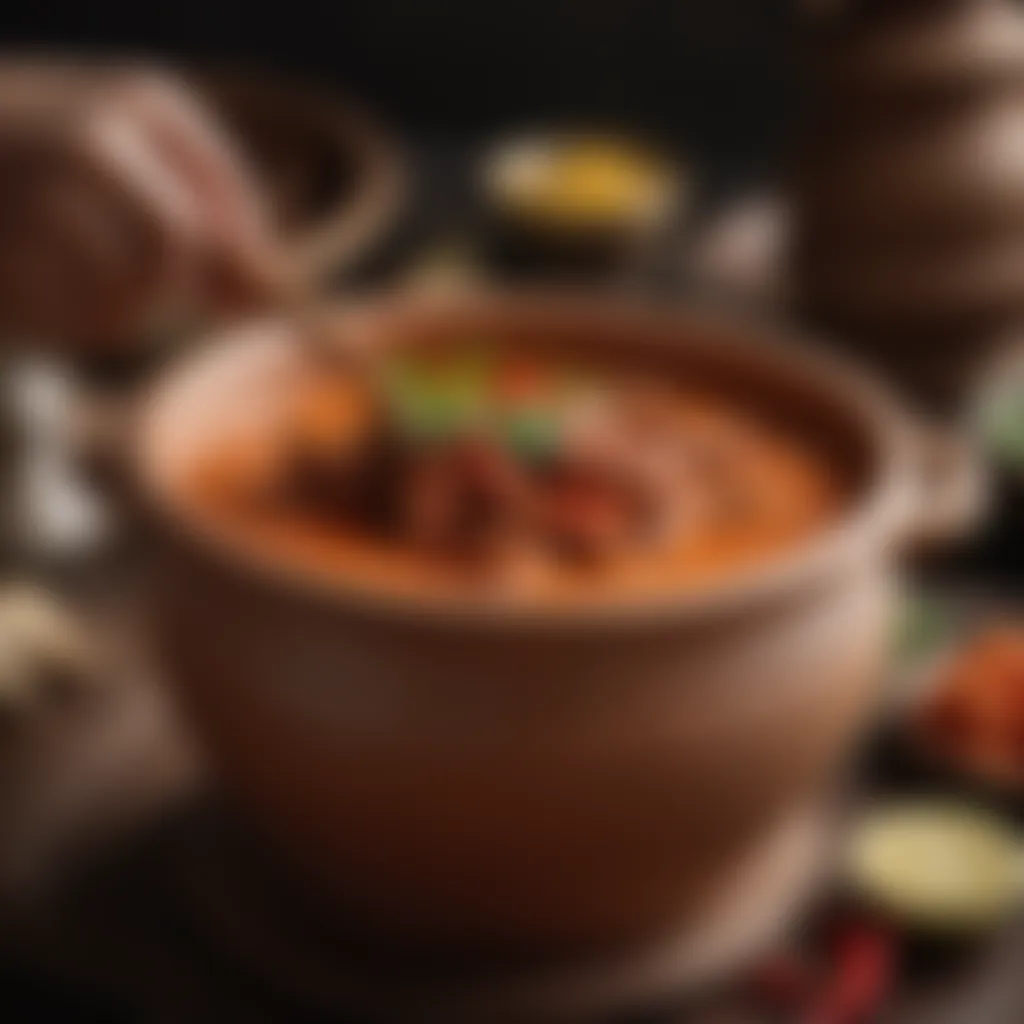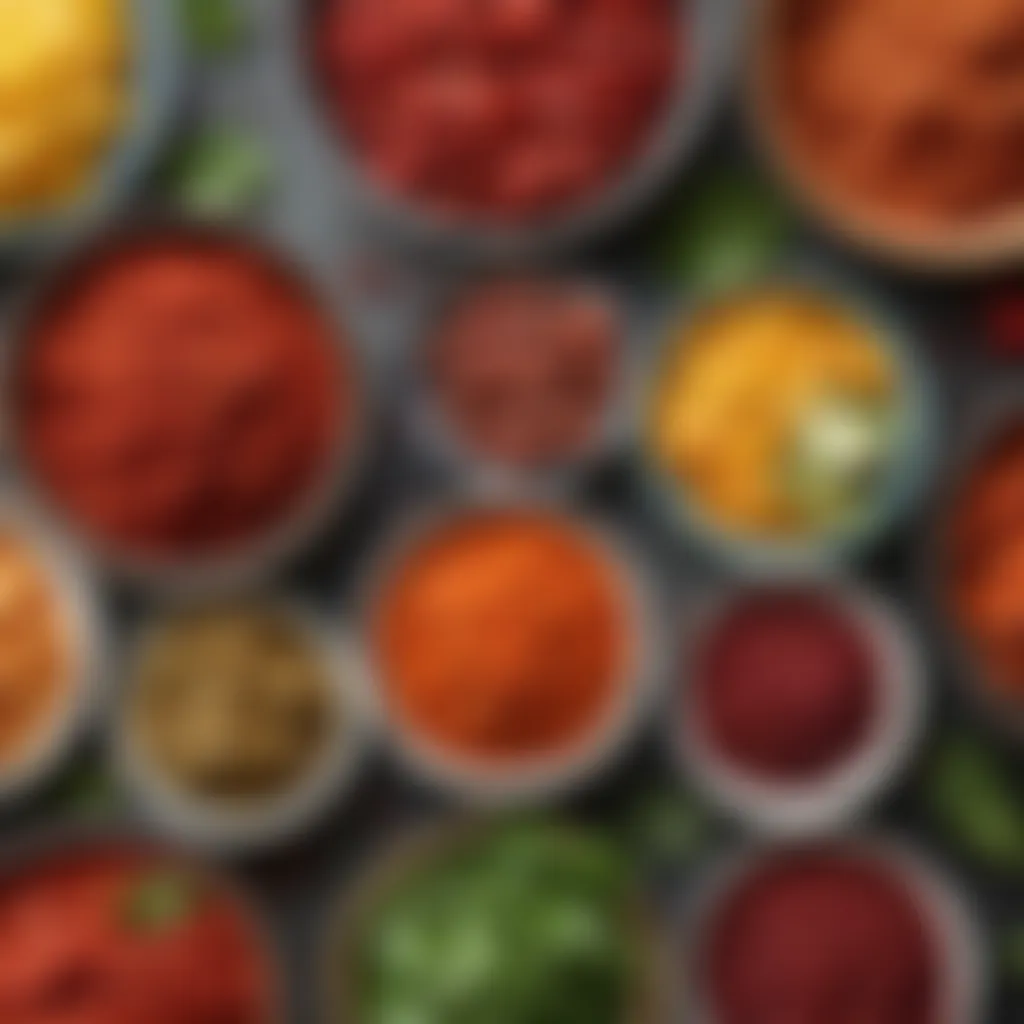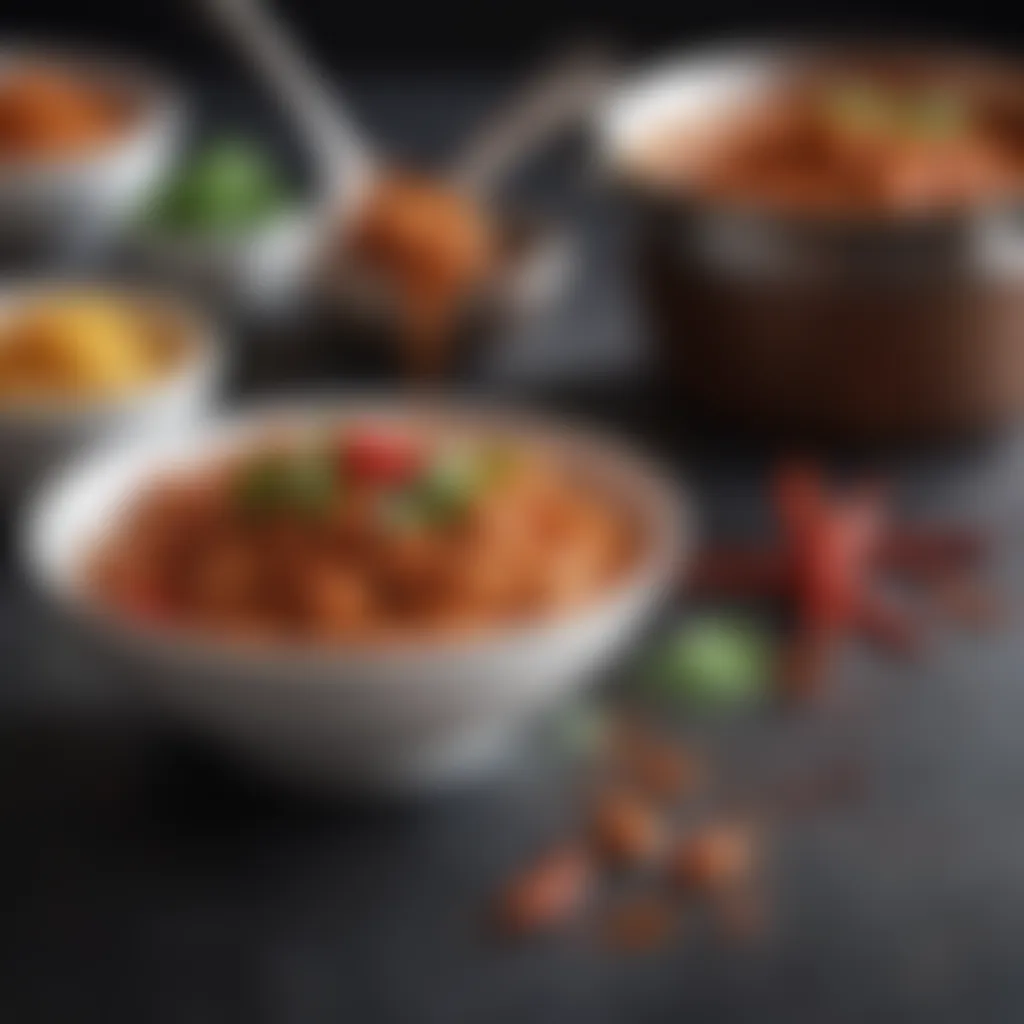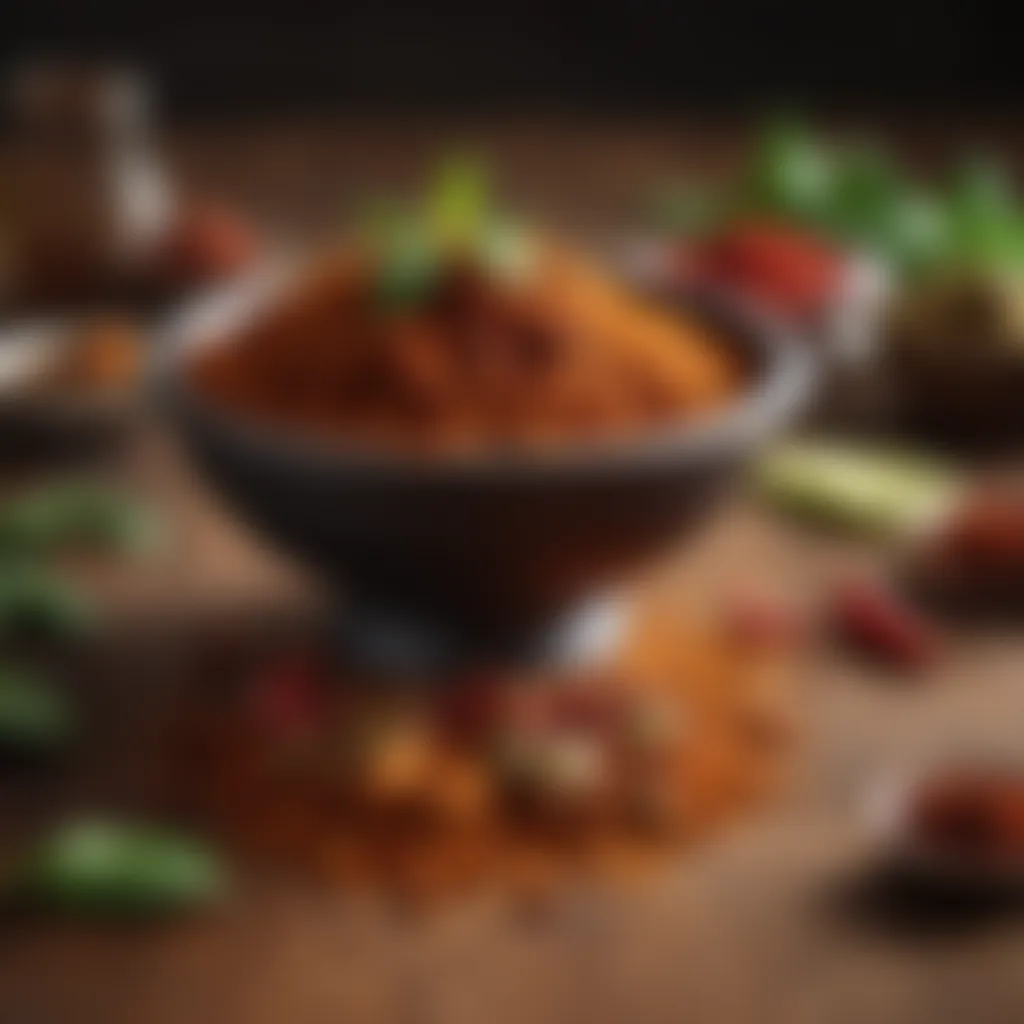Exploring Red Thai Curry Paste: Flavors and Impact


Intro
Red Thai curry paste is not just a condiment; it is the very heart of many dishes in Thai cuisine. With its rich, aromatic profile and complex flavors, it embodies the essence of Thai cooking, inviting cooks and gastronomes alike to explore its depths. By delving into the ingredients and preparation methods, one can appreciate how this paste plays a pivotal role in the culinary experience. Alongside the ingredients, understanding the temperature and timing helps to master this integral part of Thai cooking, ensuring that generations to come can savor the authentic flavors.
Ingredients:
To create a robust red Thai curry paste that delights the palate, you'll need the following ingredients:
- Dried red chili peppers - 10 to 12, preferably Thai bird's eye or cayenne for spiciness, soaked in warm water
- Shallots - 4 medium, roughly chopped
- Garlic - 6 cloves, minced
- Galangal - 2 tablespoons, peeled and chopped
- Lemongrass - 2 stalks, white part only, chopped
- Kaffir lime zest - 1 tablespoon, freshly grated
- Coriander root - 2 tablespoons, cleaned and chopped
- Cumin seeds - 1 teaspoon, toasted
- Black peppercorns - 1 teaspoon, toasted
- Salt - 1 teaspoon
- Shrimp paste - 1 teaspoon (optional, for depth of flavor)
Preparation Steps:
Here’s how to whip up this amazing paste:
- Soak the Chilies:
Start by soaking the dried red chili peppers in warm water for about 30 to 40 minutes until softened. Drain and remove the stems. - Prepare Other Ingredients:
Slicing and chopping: Chop the shallots, garlic, galangal, lemongrass, and coriander root. Grate the kaffir lime zest carefully to avoid the bitter white pith. - Toast the Spices:
In a dry skillet over low heat, toast the cumin seeds and black peppercorns until fragrant, about 3 to 5 minutes. Keep an eye to prevent burning. - Blend All Ingredients:
In a food processor, combine the soaked chilies, shallots, garlic, galangal, lemongrass, kaffir lime zest, coriander root, toasted spices, salt, and shrimp paste (if using).
Blend until a smooth paste forms, scraping down the sides as necessary. If the mixture is too thick, you can add a bit of water to help it combine.
Technical Aspects:


Understanding the technical aspects ensures your curry paste turns out just right:
- Temperature Settings:
No cooking yet, but keep any equipment at room temperature. The ingredients blend better when warmed slightly from initial preparation. - Timing Specifics:
The entire process from soaking to blending should take no longer than an hour, depending on your chopping speed. - Critical Techniques:
Pay attention to the blending process; the goal is a fine paste without any large chunks, which could affect the texture of your final dish.
Cooking Process:
Once your paste is ready, cooking with it can be just as simple:
- Heat Oil in a Pan:
Use about 2 tablespoons of vegetable oil in a wok or a heavy-based pan over medium heat. - Fry the Paste:
Add your red curry paste to the pan and fry it for about 2 to 3 minutes. You want it to be aromatic but not burnt. Watch for the oil separating slightly from the paste. - Add Coconut Milk:
Pour in 400 ml of coconut milk, stirring to combine, and allow it to simmer for about 10 minutes. - Add Proteins or Vegetables:
Incorporate your choice of meat, tofu, or vegetables. Continue to simmer until everything is cooked through, usually about another 15 to 20 minutes. - Seasoning:
Adjust seasoning with fish sauce and sugar to taste, cooking for a few more minutes to blend the flavors.
Troubleshooting Tips:
Lastly, here are some tips for common issues you might encounter:
- Too Spicy:
If it ends up burning your taste buds, add more coconut milk or coconut sugar to mellow the heat. - Too Thick:
Add a splash of water or more coconut milk to achieve your desired consistency. - Not Aromatic Enough:
Toast some more of your spices separately and mix them in for an added flavor boost.
"A deft hand can turn the simplest ingredients into something extraordinary, especially in the hands of someone who appreciates the art of cooking."
By understanding the ingredients and the methods involved, you'll not only make red Thai curry paste but also elevate your dishes into something breathtaking that speaks volumes of culinary tradition.


Prelude to Red Thai Curry Paste
Red Thai curry paste is not merely a cooking staple; it’s a vibrant testament to Thailand's rich culinary heritage. For anyone keen on journeying through the flavors of Thai cuisine, understanding this paste is essential. It encapsulates the essence of Thai cooking, combining tradition with practicality, making it an ideal entry point for home chefs and seasoned cooks alike.
Defining Red Thai Curry Paste
At its core, red Thai curry paste is a striking blend of ingredients that brings depth and complexity to a variety of dishes. Made primarily from dried red chilies, garlic, lemongrass, kaffir lime leaves, and galangal, each component plays a pivotal role in creating its signature taste. The paste embodies boldness, delivering heat without overpowering other flavors. While many recognize it as a faceless ingredient hidden at the back of the pantry, its ability to elevate a dish cannot be understated. It's not just about being spicy; it's about creating an intricate flavor profile that captivates the palate.
"In Thailand, curry paste is like the heart of many dishes; without it, you miss the rhythm of authentic flavors."
Historical Background
To truly appreciate red Thai curry paste, one must delve into its historical roots. The origins trace back centuries when Thai cuisine began integrating spices and ingredients through trade with neighboring nations. It’s believed that the paste evolved from the various cooking techniques of migrant communities merging with local traditions. The adoption of chilies, for instance, marks a dramatic shift in flavor that transformed many recipes.
Thailand embraces a diverse culinary landscape, where each region adds its touch to red curry. Spices that once roamed the earth’s roads found their way into Thai kitchens, emphasizing versatility and regional variation. Thus, red Thai curry paste is not just a condiment; it’s a reflection of cultural exchange and adaptation, a piece of history simmering in every bite.
As such, exploring red Thai curry paste offers a glimpse into the intricate tapestry of Thailand's culinary narrative, fostering a deeper appreciation for every aromatic bowl served.
The Flavor Profile of Red Thai Curry Paste


The richness of red Thai curry paste goes beyond mere ingredients; it is a beautiful amalgamation of flavors that paint a complex picture on the palate. Understanding these flavors is crucial, especially for someone wanting to master this facet of Thai cuisine.
The flavor profile consists of several elements that contribute to the paste's uniqueness. Each component plays a different role, creating a symphony of tastes that ranges from fragrant to fiery. This section will explore those essential elements, their benefits, and considerations when using red Thai curry paste.
Analyzing the Taste Components
The taste components of red Thai curry paste are a journey in itself. It often starts with a sharpness that hits you right at the back of the throat—this is primarily due to the fresh red chilies, which can vary in heat but generally present a bold spiciness. The heat isn’t just for show; it helps enhance the flavors of the other ingredients.
In addition to the spiciness, there is a layer of sweetness that balances the heat, primarily from the addition of ingredients like shallots and sometimes even palm sugar. Such sweetness rounds off the pungency, making the paste approachable for diverse palates.
The earthiness from ingredients such as coriander roots and cumin contributes depth, providing an almost grounding element that can evoke comfort. Finally, when you add some zest from lime leaves or a hint of fish sauce, you're not just seasoning; you're elevating the flavor profile.
Here’s a breakdown of key taste components:
- Heat: Mainly from red chilies. Can vary widely.
- Sweetness: Comes from shallots or palm sugar.
- Earthiness: Mostly from coriander roots and cumin.
- Freshness: From lime leaves or lemongrass.
Balancing Sweetness and Heat
Striking a balance between sweetness and heat is akin to walking a tightrope. Too much heat can overwhelm the senses, while excessive sweetness can make it taste more like dessert than a curry. For instance, using fresh red chilies often provides that initial kick. However, if you're cooking for a crowd that might not welcome intense heat, carefully adjusting the quantity can make a world of difference.
A great tip is to taste as you go. Adding just a spoonful of sugar or a dash of fish sauce at the end can help tweak flavors. Do remember: a little sweetness helps mellow out the spice, making it more palatable, especially for those new to Thai cuisine.
- Start with a small amount of chili, then adjust
- Introduce sweetness gradually
- Use fish sauce sparingly as it adds both saltiness and umami







